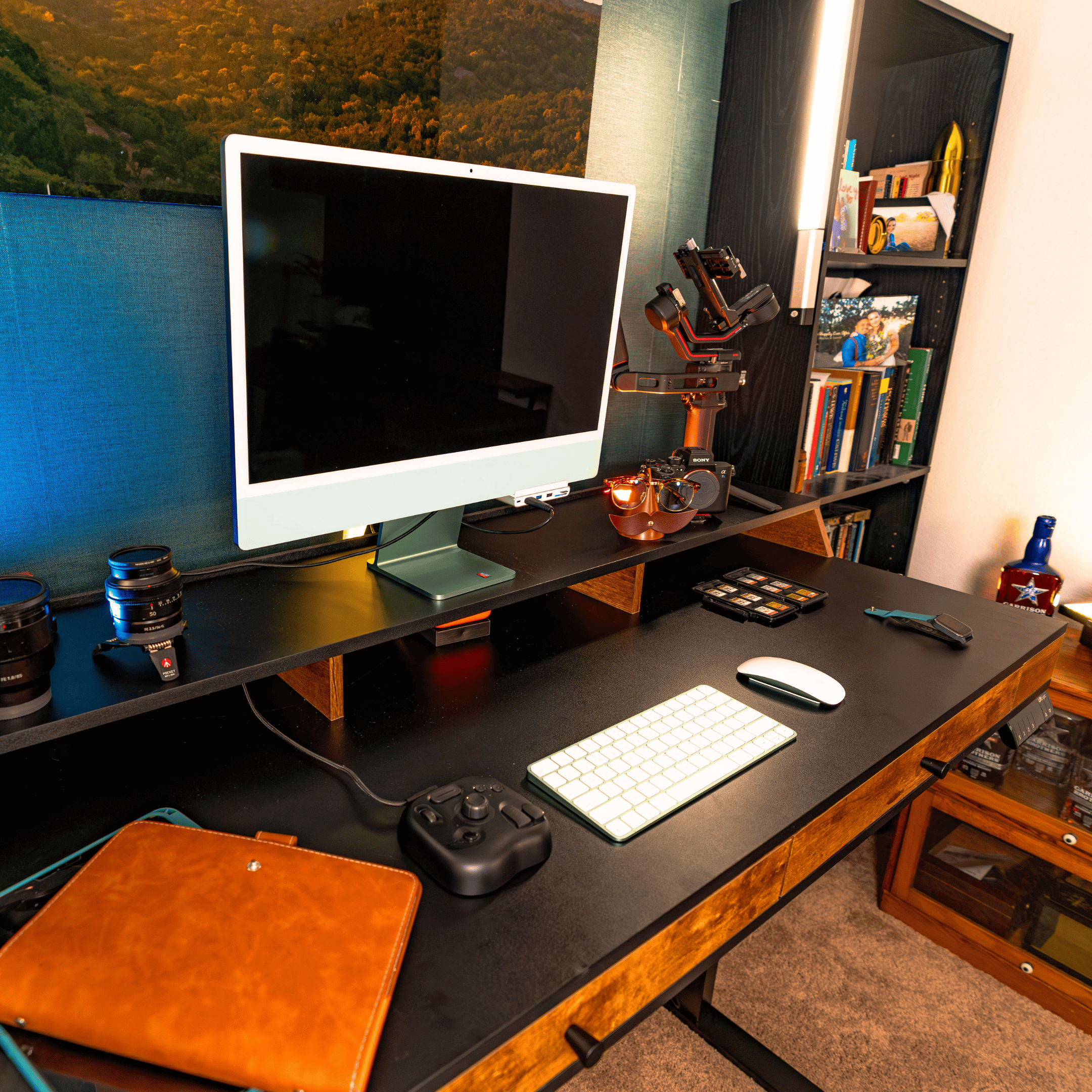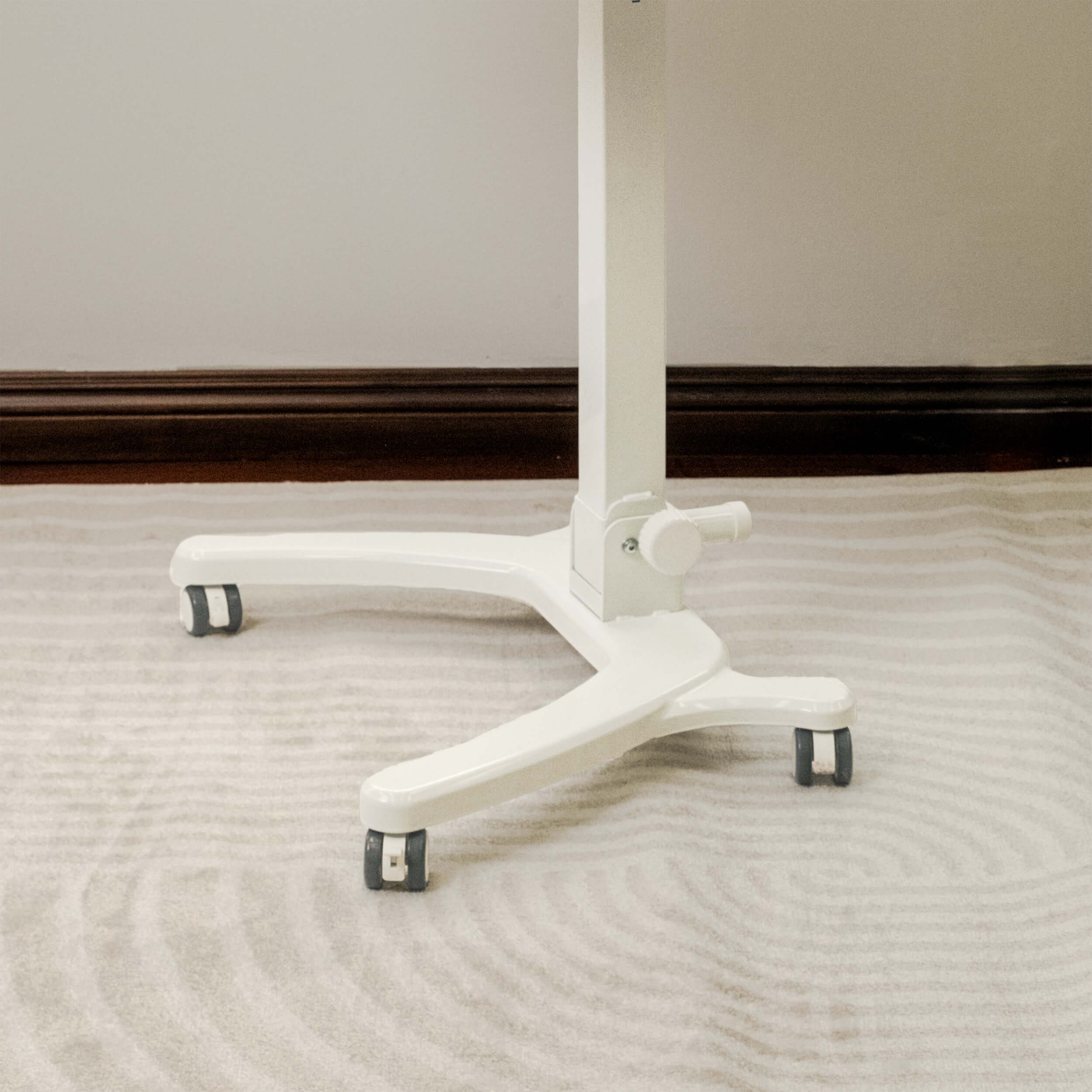The modern way of living requires us to spend an ever-increasing amount of time at home. According to official government sources, in 2021, the total number of people working from home tripled from 5.7% to 17.9%.
Therefore, unless office work is not even a tiny part of your daily routine, the way you organize your furniture matters and ultimately affects your quality of life. It affects not only the way you feel but also plays a major role in your productive output.
Those who have been experimenting with different furniture placements often ask: should a desk be placed in front of a window? Just think about how an abundance of natural light could lift your spirits, literally making you look at the sunny side of things. At the same time, considerations may arise, including potential screen glare that could get in the way.
So, before making a decision, it’s important to analyze the question both from its positive and negative aspects alike, and that’s exactly what we’ve set out to do. Towards the end, we’ve also researched what the ancient practice of Feng Shui has to say about the matter. Let’s dive in!
What is the optimal placement of a desk?
Since your desk is your central base of operations and the place where you do your work, it absolutely makes sense to pay attention to where it’s placed. The effects of this show themselves in a variety of ways and have to do with your:
-
Productivity
-
Well-being
-
Comfort
Should the window be directly behind your screen?
Your desk is where your monitor is placed. This means you also need to consider the sunlight that’s shining onto it - otherwise, you’re going to need to invest in blinds or other solutions to block it out. Without them, you’re going to experience glare, which is something that tends to contribute to visual strain that’s going to make working at your desk unpleasant.

Should your desk be placed in front of a window?
One of the obvious benefits of doing so it being able to enjoy the natural light. This has multi-faceted benefits as it:
-
Boosts your productivity
-
Reduces eye strain
-
Elevates your mood
-
Gives you a great view
-
Regulates the temperature and airflow
The next time you sit down to work, just imagine peeking through the curtains and taking in the marvelous view, all of which is bound to make you motivated for work and help you stay productive.
Should the window be to the side of your desk?
This is what we like to call the golden middle ground as it is a solution that offers plenty of sunlight while minimizing the negative aspect of screen glare. It also allows for plenty of room to angle your desk slightly in pursuit of optimal placement.
The pros and cons of placing your desk in front of a window

If you’re still on the fence about whether you should place your desk next to the window, we’ve compiled a list of pros and cons.
Pros
-
Abundance of sunlight. It’s a known fact that exposing oneself to natural sunlight is a great source of vitamin D. The abundance of natural light will also do wonders for your mental health and overall well-being, effectively decreasing stress, elevating your mood, and boosting your productivity.
-
Improved ventilation. Simply opening the window when you feel burned out from work will almost instantly freshen up the air in the room. A fresh breeze like this tends to have a psychological effect on your mind as well.
-
It makes you want to take a break more often. All of the positives are likely to motivate you to take a break more often and practice gratitude. Also, your eyes will take you for taking that much-needed screen break.
-
It helps improve the quality of your sleep. Studies show that exposing oneself to natural sunlight helps contribute to a better sleep quality, makes you fall asleep faster and contributes to a longer sleep. It all has to do with your body’s circadian rhythm.
-
Less artificial lighting. As a general rule of thumb, you want to aim towards reducing your exposure to artificial lighting as much as possible. Plus, think of all the power savings that surface as a result of not having to use your desk light so much as you’ll be utilizing natural sources of light instead.
-
Feeling less claustrophobic. Spending your time behind closed doors can truly do a number on your mental health, especially if it’s throughout a prolonged period of time. Being closer to sunlight will make you more connected to nature and the life outside of your home.
-
Getting inspired. If you’re the creative type, you know full well how important it can be to find sources of inspiration. Extra sunlight is likely to boost your creative thinking and dispel your boredom.
-
An illusion of size. Smaller rooms sometimes have the problem of appearing overly cramped. Placing your desk directly in front of the door effectively creates an illusion of space.
Cons
-
Glare and bright light. Extra sunlight is not ideal for video conferencing. Depending on the amount of sunlight in your area, having a glow of sunlight in your face during a live call might not be ideal. It can also make it harder to focus on the task at hand. However, installing blinds may mitigate the effect.
-
Poor Feng Shui. However, this only applies if you were to place the desk is such a way that would put the door behind your back. The latter scenario tends to make a person extra vigilant and observant in regard to who might be creeping up from behind, which is a major distraction from actually doing the work.
-
Unpleasant temperature fluctuations. Depending on your local climate and season, it can get uncomfortably warm during daytime hours, which makes it hard to maintain a suitable temperature that’s conducive to productivity and general well-being.
-
Visual and auditory distractions. If your window happens to be overlooking a busy street, this could make you lose focus as it is a massive distraction. Similarly, there might be a lot of noise outside (like honking and people arguing) which also acts as a nuisance as well as a distraction from work.
Tips for placing a desk in front of a window
Think that placing a desk in front of a window is just a physical task of carrying it there? Wrong. You need to put on the thinking hat of an interior designer and consider all the choices that you can make that will either optimize its placement or the opposite. For instance, are you going to angle it towards the walls or the entrance? If your room has many windows, which window is it going to be?
Below, we’ve prepared a handful of tips that will help you make the right decision:
1. Choose the optimal window
You need to think long-term; which factors do you think will make you fond of your decision over the course of time? How will changing seasons affect your decision? Think in terms of the level of noise, light sources, convenience, and similar contributing factors.
2. Consider the security and privacy aspects of your desk placement
If there’s a door right behind you, would you mind someone peeking over your shoulder or jumping behind your back to potentially startle you? Is there any sensitive or personal information at stake? If that’s a legitimate concern, perhaps it wouldn’t hurt to place a mirror on your desk that acts as your second set of eyes.
3. Place the desk so that the light isn’t a detractor
Sunlight is generally good, but you don’t want too much of it. If your room has multiple windows, experiment with these, as well as with different ways to slightly angle the desk. The idea is to harness the power of natural sunlight while reducing the excess glare. Otherwise, it can make computer-related tasks that require you to see the screen much more of a nuisance than they need to be.
4. Consider sitting with the window behind your back
Your home office setup matters more than you might think. This should be part of your experimenting with different furniture and desk placements - make sure to test it during peak sunlight to ensure glare won’t be ruining your experience. With your back towards the window, you won’t be bothered by the distractions outside. Also, you will be able to easily monitor the entrance to your room.
5. Invest in a new set of curtains or blinds
Considering you’re going to be spending a lot of time sitting at your desk, it only makes sense to have a way to control how much light can enter the room. Therefore, when considering which blinds or curtains to pick, adjustability is key. Also, they should allow you to close them easily to ensure extra security and privacy while you’re not in the room.
6. Get a nice chair that goes along with your desk
If you’ve been dealing with back pain issues, an ergonomically-shaped chair will be your best friend. You can even get two; one for colder and one for warmer months (this is mostly in reference to its materials and padding).
7. Pick the right size and shape of your desk
First of all, you need it to fit in. But also, you don’t want it to be too large to avoid bumping it into something. If your current desk simply doesn’t meet the criteria, think about getting a new one. Pick something suitable on the comfort/size spectrum; you want to have ample workspace, but not at the cost of making your room seem cramped. As far as the desk shape goes, consider getting an L-shaped desk to utilize those corner spaces while also reaping the benefits of increased storage.

Pro tip: LiftSync Pro L is a great way to utilize an unused space in the corner, especially if there’s a window there. It can serve either as a sitting or a standing desk while providing as much workspace as you could possibly need. Dimensions: 63 x 55.
What does Feng Shui say about positioning your desk in front of a window?
Feng Shui is an ancient Chinese practice aimed at helping you create a more balanced energy in your living spaces. We’ve summarized its key views regarding whether your desk should be placed in front of a window or not.
The door must not be behind your back
One of its teachings is to avoid having the door directly behind your desk so as to not leave your back exposed. Ideally, you should have it positioned diagonally opposite the window. The idea is to be able to monitor who enters and leaves the room. In essence, this makes you less likely to be distracted and constantly vigilant.
Creating an open space
Another one of its principles has to do with having an unobstructed line of sight when it comes to the window’s view. According to Feng Shui, even things like curtains or blinds may act as something that obstructs the view, so although they help regulate how much sunlight enters the room, it doesn’t look favorably upon them. The idea is to create an open space.
The placement of your desk in relation to natural elements
Last but not least, you should consider the impact of greenery. The idea is for it to help you achieve a sense of calmness and tranquility. If you feel well and in the presence of something that can be described as positive energy, you are likely to be that much more productive as well. Note that Feng Shui places a great deal of importance on living in balance and harmony with your environment.
Conclusion
Whether your desk should be placed in front of your window or not is ultimately a personal decision. Many factors go into it, the majority of which we’ve covered in today’s article. These mostly boil down to your tolerance for glare and potential distractions, and the reward is an abundance of sunlight that tends to have an overwhelmingly positive effect on one’s mental health and well-being, not to mention productivity.
If you’re a practitioner of Feng Shui, you should make extra sure not to position the entry and exit door in a way that puts it directly behind your back. Is your current desk simply not up to the task? Perhaps you need a new one. See if there’s anything you like from our selection of standing/regular desks that are designed with all sorts of occasions, preferences, and styles in mind.






Share: